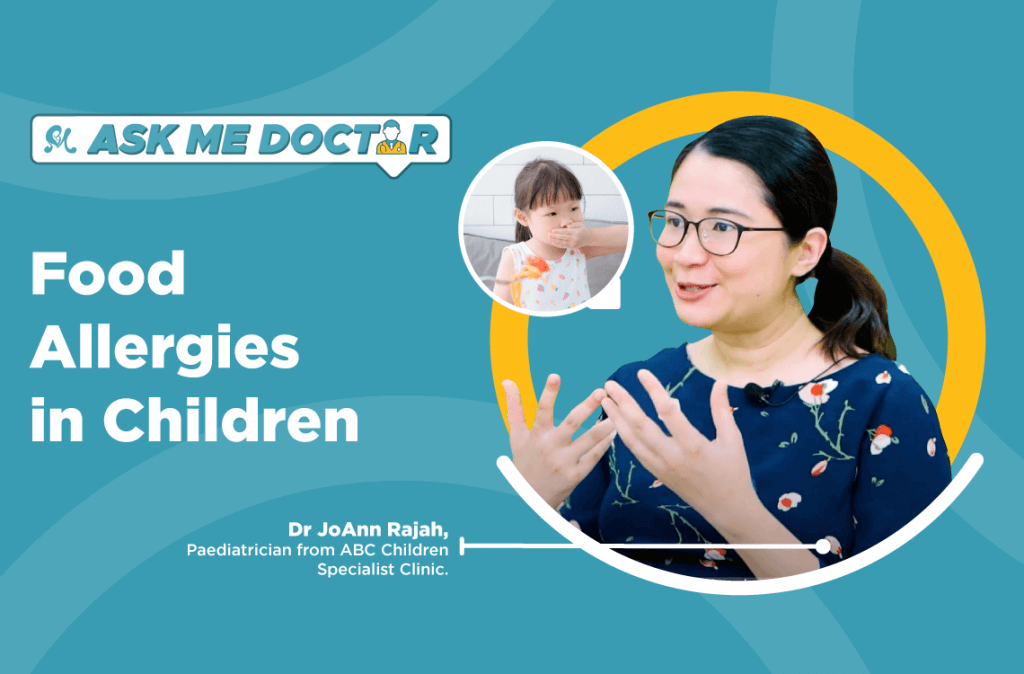A food allergy happens when a child’s body reacts against harmless proteins found in foods.
Any food protein such as egg white, fish, milk and also peanuts can trigger an allergic response that usually happens shortly after the food is eaten.
Allergy to cow’s milk is particularly common. As parents, you must know that food allergy is different from food intolerance, even though they may have very similar symptoms.
Today, we have Dr. JoAnn Rajah, a paediatrician from ABC Children Specialist Clinic to help us understand more about food allergies in children.
Q1: What causes food allergy in children?
Dr. JoAnn: Food allergy is caused by the immune system overreacting towards a particular protein found in food.
Even taking in tiny amounts of the food can result in an allergic reaction. Most food allergies are diagnosed in children but, some can occur in older children and in adults.
Q2: How do we differentiate a food allergy and food intolerance?
Dr. JoAnn: Both food allergy and food intolerance may share some common symptoms, but, the differences between the both of them are far and wide.
-
Food intolerance
Food intolerance occurs in the digestive tract.
It is due to the inability to break down food due to the lack of enzymes, sensitivity to food additives and also reaction towards naturally occurring chemicals in the food.
-
Food allergy
Food allergy, on the other hand, involves the immune system. For instance, if you are allergic to cow’s milk, your immune system will identify the cow’s milk as an intruder to the body.
Now, what happens is when you are exposed to cow’s milk protein, your body starts to produce antibodies in the form of immunoglobulin E (IgE).
This immunoglobulin E (IgE) then leads to a cascade of chemicals that are released in the body that results in allergic reactions.
So, in food allergy, taking in tiny amounts, touching or even breathing in the food can result in severe allergic reactions.
Q3: What are the foods that cause the most common allergic reaction?
Dr. JoAnn: The top eight foods that can cause 90% of food allergies are as follow:
- Cow’s milk
- Soy
- Wheat
- Peanuts
- Tree nuts
- Egg
- Fish
- Shellfish
Q4: What are the other signs and symptoms of a food allergic?
Dr. JoAnn: Most allergic reactions involve the skin, causing rashes, itchiness and swelling.
In severe allergic reactions or also known as anaphylaxis, there can be vomiting, diarrhoea, breathing difficulty, swallowing difficulty, dizziness or loss of consciousness.
Any child with symptoms of food allergy should be seen by a doctor so that the severity of the allergy can be assessed and that will actually influence further management.
Q5: How do you identify or diagnose food allergies in children?
Dr. JoAnn: The diagnosis of food allergy begins with a good clinical history as well as a physical examination.
Sometimes your doctor might refer your child to see an allergy specialist doctor, in which he would prescribe certain tests to be done to confirm the underlying allergy.
Now, these tests can include a skin test or even a blood test to look for specific IgE which is present in the blood towards a particular food.
It is important to know what food you are allergic to so that you can prevent it.
Q6: What are the treatments for food allergies?
Dr. JoAnn: If we are talking about mild allergic reactions like itchiness or rashes, these can be treated with the intake of antihistamines.
However, life-threatening allergies will require emergency treatment and possibly hospital admission.
So, in children with a history of severe allergic reactions to food, the doctor may want him or her to carry along an adrenaline auto-injector in case of emergency.
Q7: What are the best ways to prevent food allergies?
Dr. JoAnn: Once a food allergy is diagnosed, alright, strict avoidance of the allergens and foods containing it would be recommended.
Q8: Will my child outgrow the food allergy as he grows up?
Dr. JoAnn: Yes! Most children tend to outgrow allergies although food allergies from peanuts, fish and shellfish can sometimes be lifelong.
It can be very difficult to differentiate between food allergy and food intolerance. Before you decide to remove certain foods from your child’s diet, it is important to consult your doctor first.
Unnecessary food restrictions can deprive children from the nutrients they need, affecting their growth and quality of life.
Once your child has had an allergic reaction, it is better for you to bring him to the nearest clinic and get him examined.
Many mild to moderate allergic reactions can be treated at home or with medications prescribed by the doctor.
For more videos about your children’s health, stay tuned for the upcoming videos on AskMeDoctor!
